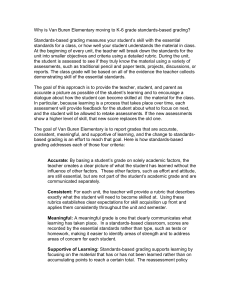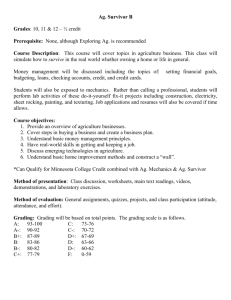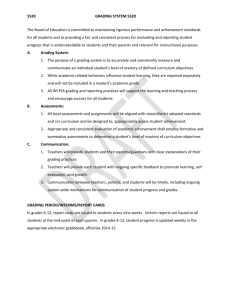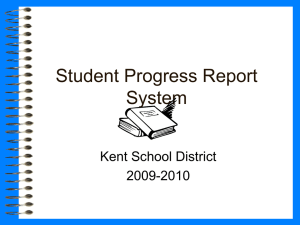Ongoing Frustration in Standards-Based Grades
advertisement
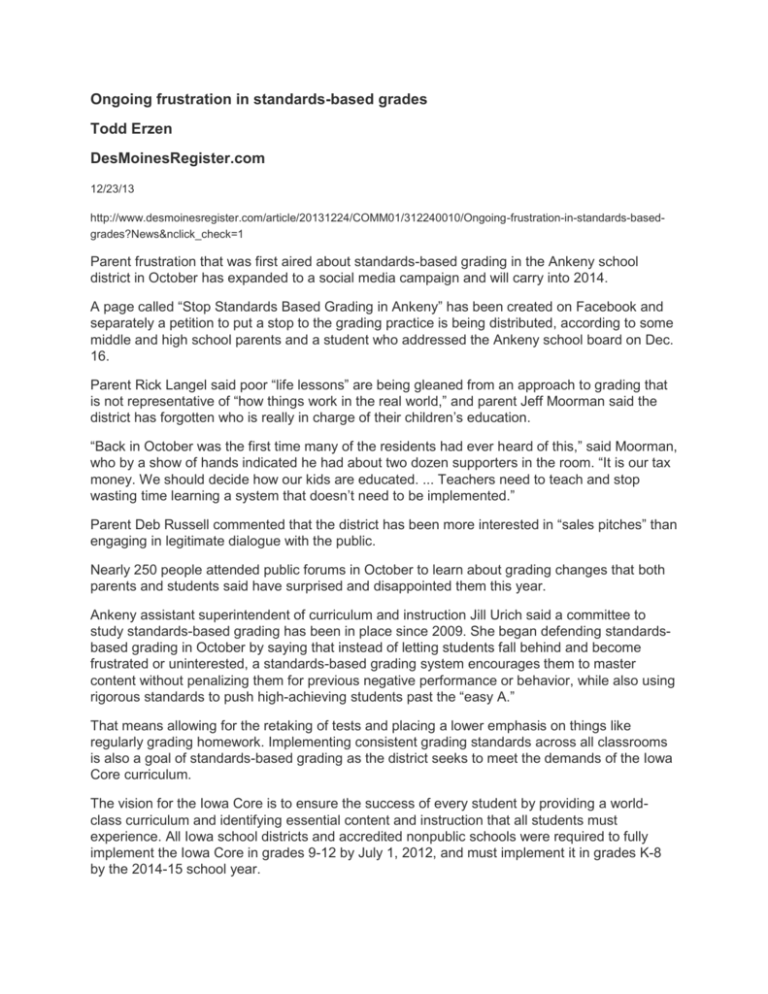
Ongoing frustration in standards-based grades Todd Erzen DesMoinesRegister.com 12/23/13 http://www.desmoinesregister.com/article/20131224/COMM01/312240010/Ongoing-frustration-in-standards-basedgrades?News&nclick_check=1 Parent frustration that was first aired about standards-based grading in the Ankeny school district in October has expanded to a social media campaign and will carry into 2014. A page called “Stop Standards Based Grading in Ankeny” has been created on Facebook and separately a petition to put a stop to the grading practice is being distributed, according to some middle and high school parents and a student who addressed the Ankeny school board on Dec. 16. Parent Rick Langel said poor “life lessons” are being gleaned from an approach to grading that is not representative of “how things work in the real world,” and parent Jeff Moorman said the district has forgotten who is really in charge of their children’s education. “Back in October was the first time many of the residents had ever heard of this,” said Moorman, who by a show of hands indicated he had about two dozen supporters in the room. “It is our tax money. We should decide how our kids are educated. ... Teachers need to teach and stop wasting time learning a system that doesn’t need to be implemented.” Parent Deb Russell commented that the district has been more interested in “sales pitches” than engaging in legitimate dialogue with the public. Nearly 250 people attended public forums in October to learn about grading changes that both parents and students said have surprised and disappointed them this year. Ankeny assistant superintendent of curriculum and instruction Jill Urich said a committee to study standards-based grading has been in place since 2009. She began defending standardsbased grading in October by saying that instead of letting students fall behind and become frustrated or uninterested, a standards-based grading system encourages them to master content without penalizing them for previous negative performance or behavior, while also using rigorous standards to push high-achieving students past the “easy A.” That means allowing for the retaking of tests and placing a lower emphasis on things like regularly grading homework. Implementing consistent grading standards across all classrooms is also a goal of standards-based grading as the district seeks to meet the demands of the Iowa Core curriculum. The vision for the Iowa Core is to ensure the success of every student by providing a worldclass curriculum and identifying essential content and instruction that all students must experience. All Iowa school districts and accredited nonpublic schools were required to fully implement the Iowa Core in grades 9-12 by July 1, 2012, and must implement it in grades K-8 by the 2014-15 school year. Urich said the traditional ways of grading could allow for three very different students to obtain C’s based on a grading system that lets individual teachers assign different weights to things like the completion of homework or use of extra credit. One student might test well despite being unmotivated to complete homework on a regular basis, another might struggle on tests but get all the homework done and complete extra credit unrelated to the content being tested, and yet another might be an average performer across the board. All three students clearly would not have mastered the required content at the same level, Urich said, and some would not have mastered it at all. Yet all could end up with the same grade based on historical classroom practices. Yet for high school junior Kylie Moorman, the past practice made far more sense. She said this year’s implementation of standards-based grading, which evaluates students according to a numeric competency scale that can then be translated into letter grades, has varied in clarity and consistency from classroom to classroom. “It’s really annoying, honestly,” she said. “It’s weird. Everything is very confusing and mixed up. I can take tests over, so I don’t try as hard. My grades have gone down this year because I am less motivated to do my homework.” That sounds familiar to Kara Hadley, whose said her eighth-grade son is now floundering because of standards-based grading. “I’ve seen changes in him, and not for the better,” Hadley said. “We already tolerate high taxes and tax increases because it is for our children’s schools. What have we gotten in return? An administration that experiments on our kids.” Standards-based grading was originally going to be rolled out in the district more than a year ago, Urich has said, but teachers spoke up to say many of them weren’t then comfortable with it. And committee work remains ongoing to develop a formal “district stance” to address parent, student and teacher concerns about test retakes and grading homework. “Teachers are at different places on this continuum just like students are,” Urich said. “Parents have a lot of misinformation about this. Grading has been inconsistent for years. That’s not a standards-based grading issue, and we aren’t talking about doing away with letters grades.” But if misinformation is a problem, said parent Ivo Lopez, it is in large part due to district communication. “It feels like why even talk with you or waste our time,” Lopez said. “How can we be rushing into a system that not even the teachers are understanding?”
